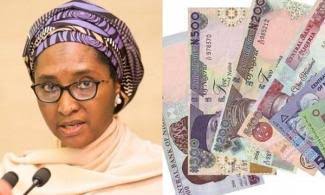Uyai-Abasi Etido
The Central Bank of Nigeria (CBN) has replied the Minister of Finance, Budget and National Planning, Zainab Ahmed, claiming that it followed due process as far as redesigning three naira notes is concerned.
The CBN’s response is coming after the Finance Minister faulted the it’s plan to redesign naira, describing it as ill-timed.
Zainab who spoke during budget debate of the ministry before the national Assembly, said CBN did not consult her ministry before taking the decision to redesign naira notes by December.
The bank’s spokesman, Mr Osita Nwanisobi, in response to the Minister expressed surprise at her claim, stressing that the CBN remains a very thorough institution that follows due process in its policy actions.
In his words: “The Management of the CBN, in line with provisions of section 2(b), section 18(a), and section 19(a)(b) of the CBN Act 2007, had duly sought and obtained the approval of President Muhammadu Buhari in writing to redesign, produce, release and circulate new series of N200, N500, and N1,000 banknotes.”
He urged Nigerians to support the currency redesign project, he said it was in the overall interest of Nigerians.
Noting that currency management in the country had faced several escalating challenges which threatened the integrity of the currency, the CBN, and the country, adding that every top-rate Central Bank was committed to safeguarding the integrity of the local legal tender, the efficiency of its supply, as well as its efficacy in the conduct of monetary policy.
On the timing of the redesign project, Mr. Nwanisobi explained that the CBN had even tarried for too long considering that it had to wait 20 years to carry out a redesign, whereas the standard practice globally was for central banks to redesign, produce and circulate new local legal tender every five to eight years.
While assuring Nigerians that the currency redesign exercise was purely a central banking exercise and not targeted at any group, the CBN spokesman expressed optimism that the effort will, among other goals, deepen Nigeria’s push to entrench a cashless economy in the face of increased minting of the eNaira.

